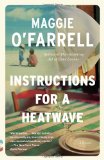Summary | Excerpt | Reading Guide | Reviews | Beyond the Book | Readalikes | Genres & Themes | Author Bio

Stoke Newington, London
Michael has walked from Finsbury Park station. A mad decision in the heat, even at this time of day. But the roads had been choked when he'd emerged aboveground, the buses stranded in traffi c, wheels motionless on the softening tarmac, so he'd set off along the pavement, between the houses that seemed to transpire heat from their very bricks, making the streets into sweltering runnels through which he must toil. He pauses, panting and perspiring, in the shade of the trees that fringe Clissold Park. Removing his tie and freeing his shirt from his trousers, he surveys the damage wreaked by this neverending heatwave: the park is no longer the undulating green lung he has always loved. He has been coming here since he was a child: his mother would pack a picnic—hard-boiled eggs, bluish under their crumbling shells, water that tasted of Tupperware, a wedge of tea cake each; they would all be handed a bag to carry off the bus, even Aoife. "No shirkers," his mother would say loudly, as they stood waiting for the door to open, making the rest of the bus look around. He can remember pushing Aoife in her striped buggy along the path by the railings, trying to get her off to sleep; he can remember his mother trying to coax Monica into that paddling pool. He recalls the park as a space of differing shades of green: the full emerald sweeps of grass, the plintering verdigris of the paddling pool, the lime-yellow of the light through the trees. But now the grass is a scorched ocher, the bare earth showing through, and the trees offer up limp leaves to the unmoving air, as if in reproach.
He draws in a breath through his nose and, realizing that the dry air burns his nostrils, takes a look at his watch. Just after five. He should get home.
It is the last day of term, the start of the long summer holidays. He has made it to the end of another school year. No more marking, no more classes, no more getting up and getting out in the mornings for six whole weeks. His relief is so enormous that it manifests itself physically, as a weightless, almost dizzy sensation at the back of his head; he has the sense he might stumble if he moves too quickly, so unburdened, so untethered does he feel. He sets off in the most direct route, straight across the burntout grass, out into the shadeless open, where the light is level and merciless, past the shut café where he longed to eat as a child but never did. Daylight robbery, his mother called it, unwrapping sandwiches from their grease-proof shrouds.
Sweat breaks out in his hairline, along his spine, his feet move jerkily over the ground and he wonders, not for the first time, how others might see him. A father, returning from his place of work to his home, where his family and his dinner will be waiting. Or a man overheated and sweaty, late, carrying too many books, too many papers, in his briefcase. A person past youth, hair thinning just a little at the crown, wearing shoes that need resoling and socks that require a darn. A man tormented by this heatwave because how is one supposed to dress for work in temperatures such as this, in a shirt and a tie, for God's sake, in long trousers, and how is one meant to concentrate when the female inhabitants of the city walk about pavements and sit in offices in the briefest of shorts, their legs bare and brown and crossed against him, in narrow-strapped tops with their shoulders exposed, just the thinnest of fabrics separating their breasts from the unbearably hot air? A man hurrying home to a wife who will no longer look him in the eye, no longer seek his touch, a wife whose cool indifference has provoked in him such a slow-burning, low-level panic that he cannot sleep in his own bed, cannot sit easily in his own house.
The edge of the park is in sight now. He's almost there. One more stretch of grass in full sun, then a road, then around the corner, then it's his street. He can make out the roofs of his neighbors and, if he stretches on tiptoe, the slates of his house, the chimney pot, the skylight beneath which, he is sure, his wife will be sitting.
Excerpted from Instructions for a Heatwave by Maggie O'Farrell. Copyright © 2013 by Maggie O'Farrell. Excerpted by permission of Knopf, a division of Random House LLC. All rights reserved. No part of this excerpt may be reproduced or reprinted without permission in writing from the publisher.
Your guide toexceptional books
BookBrowse seeks out and recommends the best in contemporary fiction and nonfiction—books that not only engage and entertain but also deepen our understanding of ourselves and the world around us.